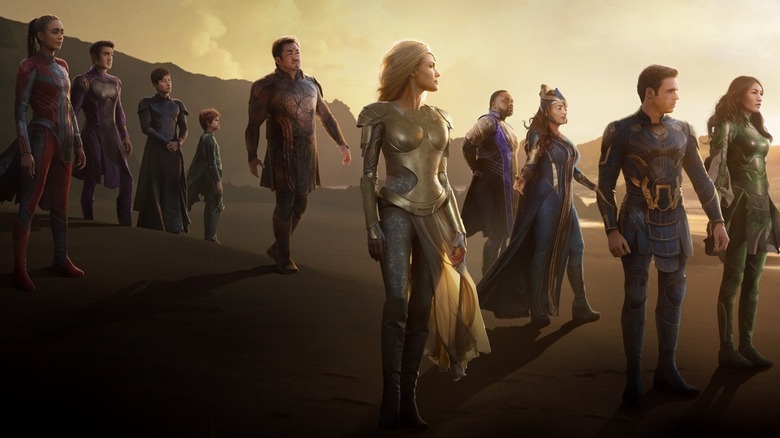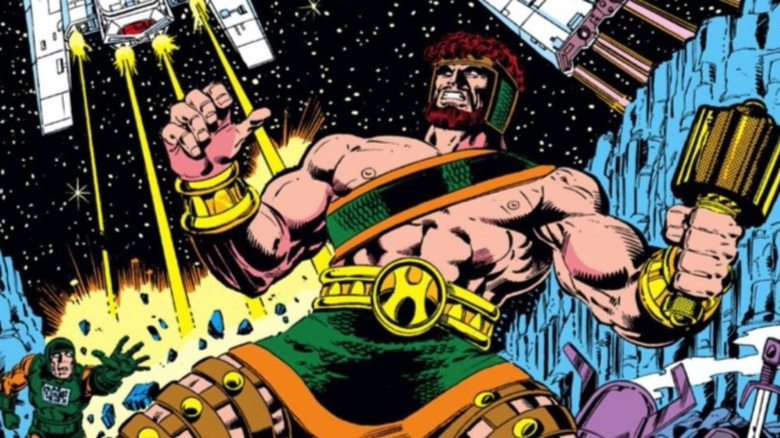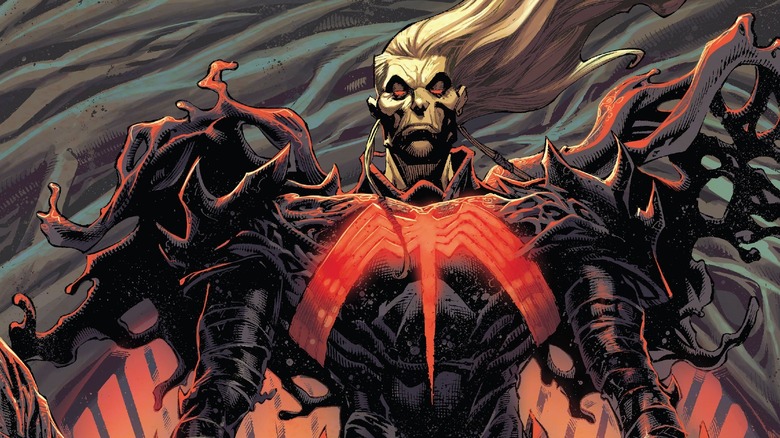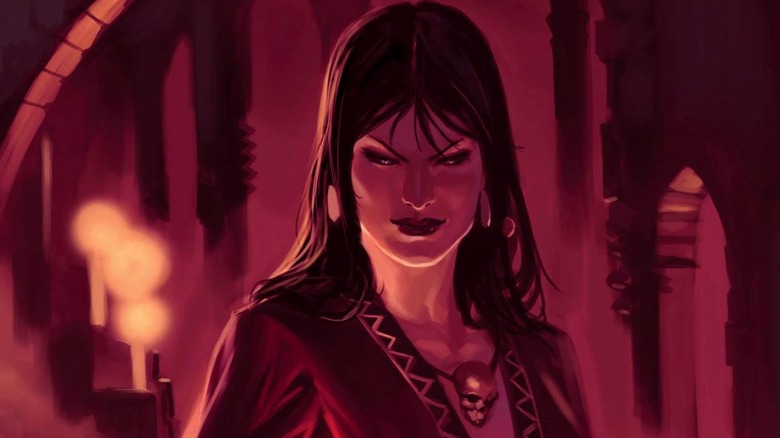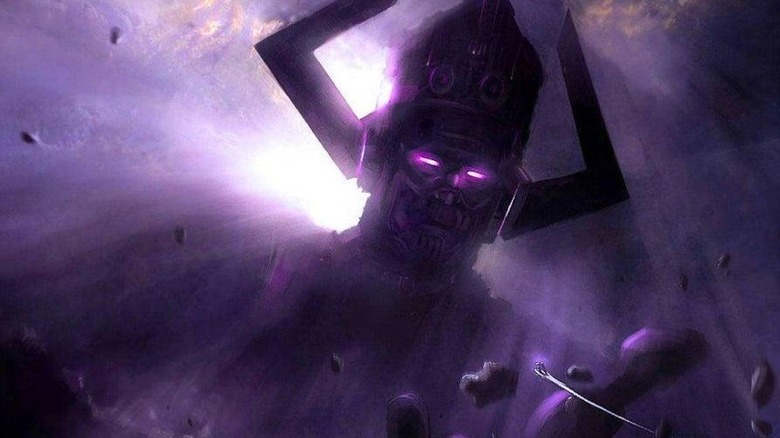Eternals Just Opened The Door To Countless Potential Marvel Movies
Spoiler warning: this article discusses some very specific surprises and plot points.
Marvel's newest high profile team has now graced our theaters in "Eternals," exploring vast new swaths of territory on the cosmic side of the Marvel universe. Following a group of the long-living, powerful Eternals as they wrestle with both the apex predator Deviants and the desires of the powerful Celestials (basically, massive space gods), it's a film full of big swings that basically upends the entire history of humanity, the universe, and our place within it.
Most importantly for Marvel purposes, "Eternals" is loaded with details that open the Marvel Cinematic Universe up for a variety of potential storylines, heroes, and villains, essentially providing the groundwork for a lot of what's to come in its next few phases. It won't be another direct deep dive into the post-credit sequences — that's already been ably handled. Instead, we're going to dig a little deeper to catch the major players the film introduces in more subtle ways. Here are some of the most important movies and characters that are opened up by the film ... and again, careful up ahead: there be spoilers.
The Olympians
In the MCU thus far, the main group of deities we've spent time with thus far are the fine folks of Asgard — Odin, Heimdall, etc, and of course the God of Thunder himself, Thor. Other deities and pantheons are key to many Marvel heroes, like Black Panther's connection to Bast or the Great Protector dragon god of Shang-Chi's Ta Lo, but they've revealed themselves relatively little thus far. Notably absent from the MCU thus far is the presence of the Greek pantheon. It's a notable omission as Hercules, Zeus's demigod son, has often fought with the Avengers as a member of the team. We've known that Zeus is set to appear in "Thor: Love And Thunder," but after "Eternals" it may be a little clearer how they'll be folded into the MCU.
In the comics, Zeus chose to reveal the existence of the Olympian gods to early humanity. The main gateway between their dimension, Olympus, and Greece lay at the top of Mount Olympus. After noting the physical similarity in powers and appearance between some of the Eternals on Earth and Olympians, the Olympians and Eternals forged an alliance with the latter serving as earthly emissaries of the former ... until that similarity begat confusion, which built to war between the factions before a new peace emerged. Olympia remains a place that Eternals live and take refuge in. In "Eternals," the Eternals' given in-world backstory is that they hail from a planet called Olympia. We come to find that the backstory is fake, instead they're synthetic creations of the Celestial Arishem, but most likely its introduction so close to Zeus' suggests that the planet is real but the Eternals aren't from Olympia ... which is quite consistent with their comic origins.
Knull
If we're looking for a big villain being built up in the MCU, all signs point to Knull, the god of the abyss at the beginning of time. Knull has nowhere been directly referenced thus far, but his appearance in the Marvel Cinematic Universe is a near certainty at this point. In comic lore, Knull is notable for a few things. First, as the god of the abyss, Knull has a long history of conflict against the Celestials. Knull is also notable for creating the symbiote species (of Venom lore), and of having the powerful weapon known as All-Black the Necrosword. Before "Eternals" brought the Celestials into the fore as forces working to keep the world from falling back into the abyss (that same abyss Knull rules), "Venom: Let There Be Carnage" brought the Venom properties, symbiotes, and MCU into the same world, while "Thor: Love And Thunder" will boast the villainous Gorr the God-butcher, whose universal slaughter of deities is aided by (of all things) his theft of Knull's weapon, All-Black the Necrosword.
So the MCU and Sony have brought symbiotes into the MCU along with a character that uses Knull's characteristic weapon. Where does the Eternals come into play? First, it highlights the Celestials' cosmic role as engines of creation who work to keep existence out of the primordial void. This reinforces our understanding of the void and establishes the terrain for Knull to wage war against existence and the Celestials, his longtime foe. Moreover, the end of "Eternals" establishes Dane Whitman, the Black Knight of comics lore who wields the magical, cursed Ebony Blade ... the blade Dane reveals in the film's final credit scene. Fun fact about Dane Whitman: he has a long history of conflict against Knull and Knull's symbiotes.
Merlin ... and Morgan le Fey
Speaking of Dane Whitman, the introduction of the Ebony Blade teases his later potential as the Black Knight, but let's dig a little deeper. The Ebony Blade is a sword that's fueled by the darkness in its wielder, and in turn it amplifies that darkness. It can slice through any object, make its wielder death proof, and provides resistance to magic. The blade was forged by the wizard Merlyn and Sir Percy of Scandia, both of which were good allies of King Arthur. First, if the Ebony Blade is involved ... this folds Merlyn into the Marvel Cinematic Universe. While Merlyn may or may not appear in the MCU, broaching this backstory opens the world up to two major magical villains: Modred the Mystic and, more importantly, Morgan Le Fay.
Modred the Mystic was an apprentice magician in the Camelot era who became corrupted by the Darkhold, the ancient magical tome we see at the end of "WandaVision" that was created by the Elder God Chthon. Time and again he succumbs to Chthon's influence and provides mystical threats, ones that could make their way into the MCU now that the Darkhold has been broached. Morgan Le Fay, however, very much has her own dark designs as well as a personal connection to Merlyn. A half-faerie sorceress, Morgan Le Fey was trained by Merlin himself in the magical arts, repeatedly plotting against King Arthur and Merlyn and providing strong magical threats to Marvel protagonists. She has a deep history with the Black Knight (introduced in 1955's "Black Knight"" #1) and has a habit of astral projecting through time and space ... meaning she can pop up in the MCU with little notice and retreat just as easily. She's a great, powerful foe whose sudden appearance wouldn't really need to be explained.
Galactus
Here's another major threat that the "Eternals" doesn't introduce directly, but for which it sets the intellectual background. "Eternals" is notable for thoroughly discussing how the Celestial race comes into existence. In essence, planets are sort of Celestial eggs. Nascent Celestials emerge from within them, drawing from the energy of the life on its surface until the Emergence, a hatching if you will, that inevitably destroys the planet and all life on it.
Celestials most certainly are not the iconic Marvel antagonist Galactus ... Galactus is the sole survivor of the universe before the Big Bang, beginning life as humanoid named Galan on a planet called Taa. His universe was dying in a massive contraction called the Big Crunch, producing a Cosmic Egg of pure primordial matter. Galan flew a spaceship into this Cosmic Egg, surviving the Crunch and emerging as the massive Devourer of Worlds, powered by cosmic energy but whose incessant hunger requires an insatiable amount of energy. He travels the cosmos, consuming worlds for sustenance. Now, Galactus has not been introduced directly in "Eternals," but it's the first Marvel film that introduces the concept that these worlds contain vast amounts of consumable energy, that very energy that facilitates the birth of new Celestials. (And indeed, if our life energy is fuel for Galactus, these proto-Celestials would be an eight course meal). We just moved from Galactus being a conceptual long shot to Galactus being a near certainty.
